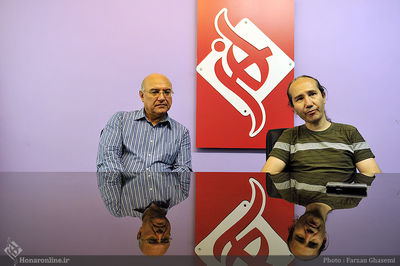It is hard to be an immigrant. Your pain more than doubles when you also happen to be an artist. But there are some individuals who can overcome this particular challenge and make it, against all odds. Aref Jafari is one of them.
The Afghan poet and singer is the founder of Afghanistan Literature House. He has been a member of numerous literary festivals such as Qand-e Parsi, Kabul Nights, and Writers Guild of Farkhar. He has just released a music album called To the Other Side of Samarkand. This gave HONARONLINE the chance to conduct an interview with him and his producer Morteza Daliri in Tehran.
Was the album worth your while?
Jafari: Gladly, reception has been upright. Many fans talk about it all the time and this gives me a lot of energy. I hope the trend will continue. I never had any expectations as to how the album would perform in the market. This was my first experience in Iran.
Why Iran? And why did you choose an Afghan accent to sing the songs?
Jafari: I always wanted to release an album. I did have another one earlier but because of mismanagement it was never released. One single entitled The River was released and many fans know me from that particular song. I was introduced to Morteza Daliri by Saeid Biabanaki. To the Other Side of Samarkand is our first collaboration.
Did you pay attention to the harmonies between Iranian and Afghan music?
Jafari: We tried to use these commonalities to win both Iranian and Afghan fans. We also used Iranian and Afghan players and poets. It’s a joint effort and indeed a watershed in strengthening and broadening cultural interactions between the two neighbors.
This is the first time that an Afghan releases a pop music album in Iran. Did you try to break the taboo?
Jafari: Other Afghan singers have released albums in Iran but most were just a repeat of old Iranian music. We are the first to release an original album.
Wasn’t it a financial risk to produce this first-ever album?
Daliri: I’m not a music producer. I did it for my own heart. There is some stigma towards Afghans living in Iran. This has to change. Many Afghans love poetry and music. This country is rich in culture. I wanted to introduce them to our people and promote their art. I’m happy to have made that right decision to produce Jafari’s album. Reception has been good. We are so happy with the results that we have already laid out plans for the next album. It will be different though.

How important is it to have sponsor as copyright law is not respected in Iran?
Daliri: It is important to have a sponsor. You have to realize that sponsorship plays an important role in the success of any music album. Copyright is important. Artists spend money and effort to create a work of art. It is wrong for audiences to get it for free. Fans could help us by buying the album just as they download music from the Internet. We can only produce the next album if people support us.
What are the differences or similarities between Iranian and Afghan music?
Jafari: They used to be identical. When Indian music became popular in Afghanistan, our music distanced itself from Iranian music. We still play Khorasan melodies but with an Indian form and style and with Indian musical instruments. Still, there are some similarities between Iranian and Afghan music. People in Afghanistan and Tajikistan listen to Iranian and Afghan pop music. They love the music because of cultural commonalities.
Any plans for a duo with Iranian singers?
Jafari: I like to work with Reza Sadeghi, Amir Tajik, and Ehsan Khajeh Amiri. I like to listen to the music of Mani Rahnama and Hamid Hami. I have already received some proposals but mostly from female singers. I like classical singers like Shajarian, Nazeri, Motamedi, and Ghorbani. Pop music is doing well in Iran while classical music has its own fans. People like them both, which is critical.
Tell us more about your next album?
Jafari: We have arranged the melodies and are still trying to write the lyrics. We might use the same group. We will, however, use more Iranian technicians.
Daliri: The arrangements will see some changes. We will mostly use Afghan instruments.
Any plans for live concerts in Iran or Afghanistan?
Daliri: We will have a concert in Iran. The problem is, we cannot have it in Afghanistan for security reasons. People there love to attend live concerts. If we do well, I will arrange concerts for Afghan and Iranian fans in other parts of the world.
Translation by Bobby Naderi

